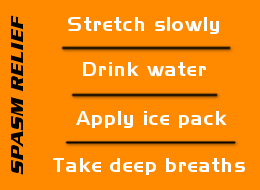Dehydration, electrolyte imbalance and injury are the most common causes of muscle spasm in the arm. It can be treated with the help of medication and other treatment methods.

Muscle spasm is the painful, involuntary contraction of muscles. One of the major causes of muscle twitching is improper functioning of the motor-neurons. Contracture is the permanent muscle contraction that results from nerve damage. Secondly, muscle spasms can also be experienced if the released calcium ions do not get reabsorbed.
Causes
Muscle Injury: Any injury to muscle, due to accident or other causes, can result in muscle spasms. Sedentary or physically inactive lifestyle, where a person does not make extensive use of his muscles for a long period, can also lead to spasms.
Strenuous Exercise: Excess stress, exercise and fatigue can result in muscle spasms in arms and hands. Spasms are more likely to occur in people who are not used to daily strenuous exercise. Remember that our body gives out signals when the body is fatigued, and one should note that it is time to take rest.
Dehydration: Sweating profusely due to any activity or exercise can lead to dehydration, consequently causing muscle twitching. Especially in higher temperature, there is loss of sodium, potassium, and calcium from the body due to excessive sweating. The body cannot recover immediately from this, therefore, one experiences muscle spasms.
Other Causes
- Poor supply of oxygen
- Electrolyte imbalance
- Myotonia
- Cerebral palsy
- Nerve damage
- Multiple sclerosis
- Twist in arm during sport
- Performing any unusual physical activity
Symptoms
The symptoms of muscle pain or spasms can vary according to the underlying cause. Sometimes, it is sudden and constant; whereas, in other times, it may even be intermittent. Sometimes, it lasts for few minutes, or sometimes, even for days and weeks. The most common symptoms include swelling, pain, rigid tightness, and sudden muscle contractions in the affected area. If it is left untreated, you may experience constant muscle twitching or spasms in arm.
Treatment
The root cause of muscle spasm has to be determined before going for any treatment. Advanced techniques like CT scan or MRI are used for diagnosing the condition. In serious cases of injury, the person may be required to undergo a surgery. Whereas, in mild cases, pain killers or injections are used. Electrolyte imbalance is treated by taking fluids containing salts and electrolytes. Similarly, if the spasm or twitching is caused due to excess straining during exercise, then rest, massage, stretching, etc., can help in providing relief.
Apart from these traditional methods, alternative treatment methods like acupuncture or acupressure are also helpful for treating muscle spasms. Natural muscle relaxants like chamomile and valerian also help in relieving muscle pain. If these natural methods do not give immediate relief, it is wise to consult the doctor as soon as possible and get immediate medical treatment.
Prevention
- You should exercise only under the observation of a certified trainer.
- As dehydration is one of the most common cause of muscle spasms, you should make sure to follow means to prevent it. It can be avoided by drinking adequate amounts of water, especially in summer and after exercise.
- Secondly, coffee and sodas should be avoided as they tend to dehydrate the body.
- On the other hand, deep breathing can be helpful if spasms are caused due to poor supply of oxygen.
You should remember that muscle spasms in arm can be treated effectively using different treatment methods. If left untreated, it can turn into a permanent or serious condition. Therefore, you must not ignore it. You should consult your doctor and seek treatment as soon as possible. Take care!
Disclaimer: This article is meant only to provide information. It should not be used as a substitute for proper advice and treatment.


 Muscle spasm is the painful, involuntary contraction of muscles. One of the major causes of muscle twitching is improper functioning of the motor-neurons. Contracture is the permanent muscle contraction that results from nerve damage. Secondly, muscle spasms can also be experienced if the released calcium ions do not get reabsorbed.
Muscle spasm is the painful, involuntary contraction of muscles. One of the major causes of muscle twitching is improper functioning of the motor-neurons. Contracture is the permanent muscle contraction that results from nerve damage. Secondly, muscle spasms can also be experienced if the released calcium ions do not get reabsorbed.